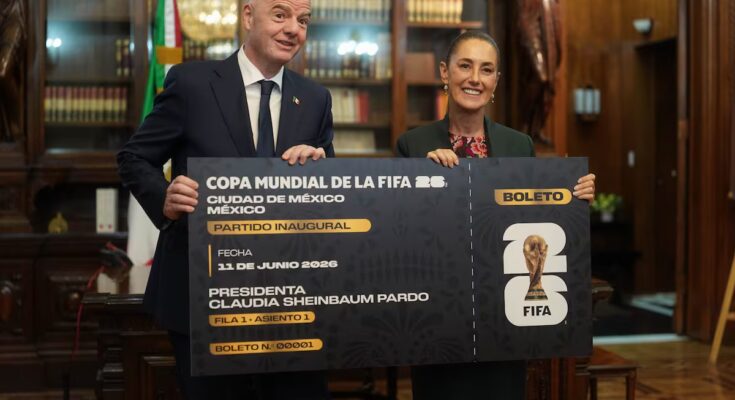The International Federation of Association Football (FIFA) and its designated clubs will not pay any taxes during the 2026 World Cup matches in Mexico City, Monterrey and Guadalajara. This is established in Mexico’s federal revenue law of 2026. One of its transitional articles states that companies “that participate in the organization, development and execution of activities related” to next year’s World Cup, which Mexico hosts together with the United States and Canada, are exempt from paying taxes. Of the three countries, only Mexico has granted FIFA a full nationwide exemption. The tax agreements reached by the United States and Canada are not comprehensive and are implemented at the national, state, and local levels.
“This was an agreement signed with FIFA in 2015, during the government of (Enrique) Peña Nieto,” President Claudia Sheinbaum said a few days ago during her daily press conference. “These exemptions were signed, so it was a contract already in place with Mexico; we changed some terms that were agreed upon at the time, but it was a signed contract, and so it’s enshrined in law because that’s the way it has to be,” he stressed. The World Cup will be held in June 2026, with the United States as the primary host, hosting 78 matches, including 13 in Canada and another 13 in Mexico.
This exemption is particularly noteworthy given that the Mexican government is engaged in a campaign to increase tax revenue without implementing any tax reform. The strategy involves increasing specific taxes and reducing opportunities for financial mismanagement. In a context of economic slowdown and increased spending on social programs, this effectively gives FIFA and any other entities it appoints across the country a blank check.
In Mexico, according to Senator Raúl Morón Orozco of the ruling Morena party, speaking to sports news network ESPN: “It applies to all companies directly involved in organizing the World Cup. All participants, all companies promoting the World Cup. Also television stations broadcasting or reporting on the World Cup and all hotels and travel groups, etc.”
According to the transitional provision, FIFA itself will have to submit to the Mexican Tax Administration Service (SAT) the names of the natural and legal persons participating in the organization and holding of the World Cup who will benefit from this regime. An exception is established: companies blacklisted by the SAT for outstanding tax debts will not be eligible for this exemption.
In 2022, ESPN obtained a copy of the 93-page document in which Enrique Peña Nieto’s government made commitments to FIFA. Titled “Government Guarantees Related to the 2026 FIFA World Cup,” it was signed by Alfonso Navarrete Prida, then Secretary of the Interior, and benefits the Mexican Football Federation (FMF), the 2026 FIFA World Cup and its subsidiaries, whether or not they have tax domicile in Mexico, as well as the 2026 FWC Legacy Fund. The document was signed in 2015, three years before FIFA awarded the World Cup 2026 in Mexico, the United States and Canada in June 2018.
In the United States, FIFA negotiated tax exemptions separately with each of the 11 host cities, most of them years after the World Cup was awarded. In Atlanta, Georgia, an extension of the existing tax exemption on game tickets was approved in 2022, with no public information on additional exemptions. Atleticothe sports supplement of The New York Timesobtained a copy of New York City’s host city agreement, in which FIFA requires “good faith non-refundable taxes to be minimized” and states that all municipal taxes will be covered by the host city.
A special case is the city of Santa Clara, California, home to Levi’s Stadium, where six games will be played. An agreement signed in 2025 clarifies that “the city has not agreed to subsidize any law, tax or fee related to World Cup events and reserves the right to approve or reject any proposal.” According to state media reports, the city council spent more than a year negotiating with FIFA to “protect the city’s finances and taxpayers.” All obligations will be transferred to the Bay Area Host Committee, a nonprofit organization dedicated to attracting sporting events to the San Francisco Bay Area, because a series of deals were allegedly made with FIFA without the knowledge or permission of the City Council.
In Canada, this tax deal sparked public discontent after deals between the cities of Vancouver and Toronto with FIFA were revealed through freedom of information requests. The deal is similar to those made public in the United States: municipal taxes paid by the city and good faith reduction of non-refundable taxes, as well as providing FIFA with high-quality office space. The current mayor of Toronto, Olivia Chow, has repeatedly criticized the onerous terms of these agreements.
Sign up to our weekly newsletter to get more English-language news coverage from EL PAÍS USA Edition



